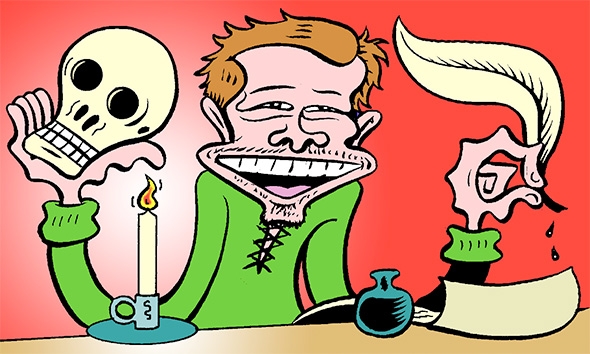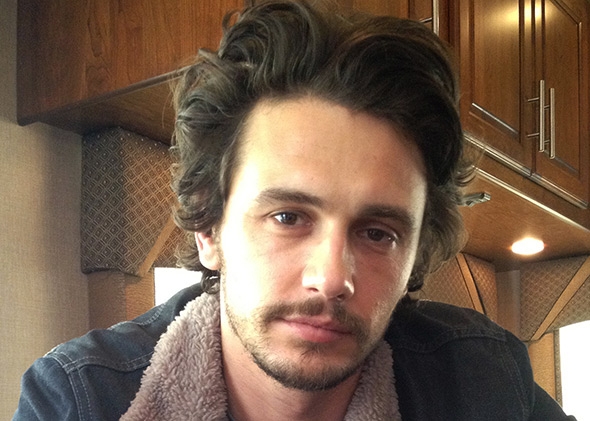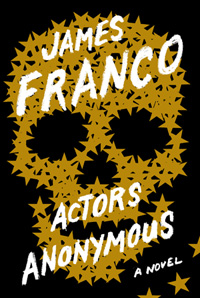
Slate is an Amazon affiliate and may receive a commission from purchases you make through our links.
“Like a King That Orders One Thing Then Orders the Opposite Thing”
Why does James Franco make people so angry?

Illustration by Peter Bagge
By pretty much all classic methods of measurement, James Franco is a hugely successful, super-mainstream movie star. Oz the Great and Powerful is currently the sixth highest-grossing movie of 2013, and with that and This Is the End, Franco is the only male actor to topline two movies that will gross more than $100 million each this year. For an indie, quasi-avant-garde freakout, Spring Breakers was huge, and Franco’s all-in performance in it is now being pushed as a dark horse Oscar contender. His Comedy Central roast was watched by 5.2 million people on its first night of air, attracting more viewers than any broadcast program on that date other than the CBS phenomenon Under the Dome.
And yet, any goodwill these stats must rack up for Franco among studio executives and potential branding partners means absolutely nothing within a pop cultural conversation that exists to generate and foment outrage. The Internet body politic may never settle on definitive answers to today’s toughest questions—Is Miley racist? Is Robin Thicke rapey?—but it long ago issued a verdict on Franco that has proven to be uniquely sticky, so much so that most of Franco’s Comedy Central roasters seemed to be plumbing 3-year-old Gawker comment threads for material. (Seth Rogen: “Franco, you look like you’re asleep. Did you just read a James Franco book?”) In daring to spend his time between starring in commercial movies doing things that are actually or essentially nonmonetizable—like taking a lot of college courses, directing art films and video installations, writing about literature for VICE, and, yes, publishing books—Franco continually commits the ultimate sin: being apparently sincerely interested in things that are presumed to be pretentious and boring.
Franco is all too aware that the more artwork he makes, the less cool it makes him. As he put it to Playboy in 2011, “There’s this feeling about me like, ‘He’s doing too many things. Let’s get him.’ ” On the one hand, it seems likely that the bulk of Team #FrancoGoAway has not actually sampled his video art, read his short stories, or seen his short films about poets that only play at film festivals; it’s pretty laughable to claim that art—even bad art, even charlatan celebrity art—intrudes uninvited into most normal people’s lives. On the other hand, Franco can be a little quick to spin his artist’s prerogative into a defense mechanism, regularly insisting that the criticism he draws from “morons in the blogosphere” is “part of my work,” and even lamely attempting to take back the power at the end of his own roast by referring to the night’s pageant of (mostly gay) jokes as “my greatest art installation yet.”
Franco’s preoccupation with his image and his critics is on full display in his latest extracurricular production, Actors Anonymous. This 285-page book has been branded as a “novel,” somewhat misleadingly. AA is more like a published notebook, full of sketches on themes rendered in a variety of different styles—sort of like a greatest hits of what one might be left with at the end of a few years in a lot of creative writing workshops. Some chapters read like personal essays, transparently referencing events in Franco’s real life (one of the best, set against the production of the late-Miramax war film The Great Raid, deals with the weirdness of learning how to simulate life-or-death situations for a movie that mattered to essentially no one), while others are written in character. Sometimes that character is called “James Franco”; sometimes the focus is on an “anonymous” celebrity known as “The Actor.”
Almost all of the most successful chapters consist of more-or-less straightforward fiction involving characters who share biographical details with Franco (one grew up in Palo Alto, another works the McDonald’s drive-thru, which Franco has said was his last day job; another becomes obsessed with the journal “The Actor” kept during the making of the Spider-Man films), but who also take on lives of their own. It amounts to a panoply of portraits of young men living in Los Angeles, many of them struggling with substance addiction and/or less-than-healthy sexual histories or tendencies, who feel pulled toward acting or the world of moviemaking in various ways, often for the promise of losing themselves in a borrowed identity. Franco continually circles back to characters who become obsessed with acting—or impersonating actors, or even just fucking actors—as a magic salve, through which they can hide a truth about themselves that would otherwise be the death of them. Franco writes with real authority about a certain kind of workaday desperation amid the promise of glamor, and the scraps of Actors Anonymous that bring that feeling to life, with a disaffection that refuses total disillusionment, are engaging. In the best sections of the book, the title evokes acting as both a kind of horrible dissociative personality psychosis, and a secret club—a projection point for desire and envy.
Unfortunately, the title is also painfully literal. The book is described in its preface as a “volume” produced by the “more than fifty men and women” of a group called Actors Anonymous who have come together to “relate our experiences in dealing with existence, modern society, and identity, in order to find suitable ways of acting and being in the world.” Franco bolsters this structuring gimmick by composing lists analogous to the 12 Steps and 12 Traditions of the more familiar AA. So, “We admitted we were powerless over alcohol—that our lives had become unmanageable” becomes, “We admitted that life is a performance—that we are all performers, at all times—and that our ‘performance’ had left our control.” “The only requirement for AA membership is a desire to stop drinking” becomes “The only requirement for membership into the acting fold is a desire for reality.”

Anna Kooris
Though every chapter is headed by a step or tradition, announcing themes to which the content correlates to various degrees, Franco’s invented “AA” doesn’t figure substantively into the subject matter of the very loose narrative of Actors Anonymous. (Several of the characters do, however, belong to the more famous AA.) A few chapters consist of list-like, vaguely connected musings on acting and celebrity, in which Franco juxtaposes slogans which could be interpreted as his real actorly philosophy (“You need to be able to take on all roles and laugh at all roles. To be able to mock the role you’re playing while you’re playing it”) with evident jokes (“I used to care about how I looked. Now I don’t care as much. Maybe it’s because I’m so handsome”). There is a letter written from “James Franco” to a film class at NYU apologizing for not warning them of the graphic nature of his video installation “Masculinity and Me,” and also for not attending the screening because another film of his was having its Tribeca Film Festival premiere at the same time. There is a chapter written in the voice of a Croatian NYU student who dreamily delineates her “fairy tale” de-virginization at the hands of one James Franco, who shows her Kenneth Anger’s Scorpio Rising as part of his seduction. She describes herself as a “stupid little girl who wants to be an actor,” and calls Kurt Cobain “the most beautiful man that ever lived. Except maybe James,” shortly after explaining why she feels “shy of my pussy.” It’s noxious not because of its (shocking!) suggestion that famous actor Franco might be sexually exploitative, but because it treats a star-struck, would-be sexually empowered young woman as a pure joke. It’s not the only chapter in the book to paint a fan as a broken person desperate to be redeemed by a star—and as that, it’s not uninteresting—but it is the only chapter written from a female perspective, and that makes its flagrantly inane voice feel pretty cheap.
Most of the time, however, Franco makes himself the center of scrutiny. The Step 4 chapter (“Made a fearless and searching moral inventory of our ‘character’ ”) consists of three poems contemplating River Phoenix’s life and death, and one called “James, It’s River,” written in the dead actor’s voice to James Franco. The best stanza of these poems is a matter-of-fact encapsulation of actorly narcissism:
Sometimes an actor will like another actor
Because he looks like him,
And sometimes an actor will hate another actor
For the same reason.
The funniest stanza is the last stanza of “James, It’s River”:
You spend your time all over, James.
You’re all over the place, James.
I was a River that flowed straight
And pure, you’re like a king
That orders one thing,
And then orders the opposite thing.
That is hilarious, intentionally or otherwise, and it’s also indicative of Franco’s approach to self-criticism in this book: He reiterates arguments that are frequently made against him, often in a moderately tongue-in-cheek fashion, but doesn’t exactly dismiss them. Occasionally, he makes a gesture of rebuttal, such as in the chapter which purports to be “The Actor’s” footnotes on an unflattering magazine profile about him. The omitted article is clearly Marc-Edouard Leon’s feature on Franco which ran in the October 2011 issue of Flaunt magazine, with an extreme close-up of Franco’s naked ass on the cover. “The Actor’s” floridly profane footnotes (“This sentence and metaphor are fucking retarded”) seem to be written in the voice of the James Franco who has been infamously aggro to journalists whom he deems hostile to his creative pursuits. Franco’s inclusion of this “character” seems self-aware, if not necessarily apologetic, and apparently designed to offer the illusion of a glimpse inside what it feels like for a celebrity to read his own unflattering press, without actually revealing anything intimate at all.
In fact, everything in Actors Anonymous that purports to reveal something about Franco and his relationship to stardom is totally worthless and hollow. That’s clearly intentional. By the end of the book, the title seems to refer not to the bullshit 12-step structuring exercise, but to the real subject of a good deal of the fiction and meta-writing inside: Franco’s embrace of the three or four things that make up his media persona, not because it’s a true representation of himself but because it’s so false, because it gives the Oz star a projection that he can use as a distraction, a curtain behind which he can lead a life. There’s being an enigma, and then there’s being so calculatedly unknowable that everyone forgets or stops caring that there was ever anything they wanted to know. There’s something real threaded within Actors Anonymous, but it’s hard to get at under all the projection. Watching Franco’s roast while I was reading AA, I thought the oddest, hardest-hitting line came from Jonah Hill. “I’ve known you for 10 years,” said Franco’s co-star in This Is the End, a movie in which they play “themselves,” “and I’m still pretty sure I’ve never met you before.”
---
Actors Anonymous by James Franco. Little A/New Harvest.
See all the pieces in this month’s Slate Book Review.
Sign up for the Slate Book Review monthly newsletter.

